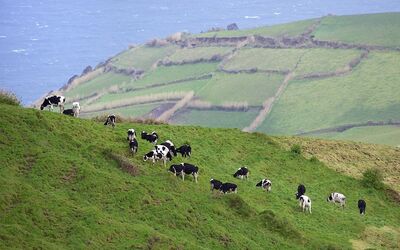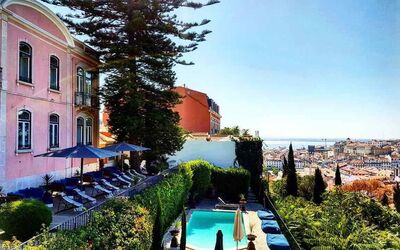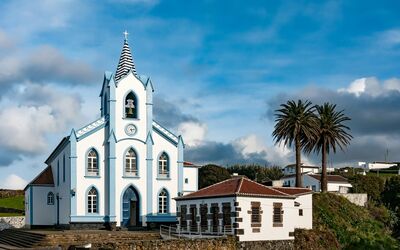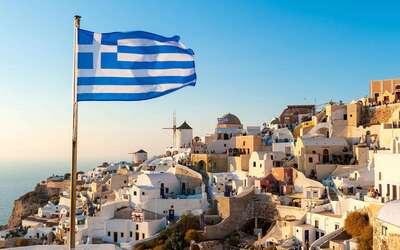The Azores are a true gem of the Atlantic. Very few places on Earth can boast the same advantages. Located in the heart of the Atlantic Ocean, the Azores offer year-round spring weather and stunning natural beauty, from cascading waterfalls to rainforests and mountains with breathtaking views. At the same time, the archipelago, unlike many "paradises," boasts first-class infrastructure and excellent transportation accessibility. The Azores are only 2-3 hours flight from continental Europe, and it is also possible to arrive here by direct flight from the USA and Canada in a little more time.
However, until recent years, the Azores have remained undervalued. Even with the growing flow of tourists and immigrants, the Azores remain a tranquil green oasis, offering investors unrivaled opportunities - unlike other parts of the country, where there are no longer any available niches. The islands are particularly suited to those looking to invest in sustainable, low-risk assets such as agriculture.
Why the Azores?
The Azores is an archipelago of nine islands in the Atlantic Ocean and part of Portugal. Due to its remoteness from the continent, it is a less popular destination than Madeira. However, in the last few years, the trend for ecotourism has launched a new wave of active development of Azores. Experts predict that this region will become increasingly profitable for investors, and the price is still low price "to enter" will grow.
From an investment point of view, the Azores remain an attractive option, even despite the imminent closure of the Portuguese Golden Visa program.
After Brexit and the political and economic turmoil of recent years, investors from the UK and the US have started to play a significant role in the Azores archipelago. "We started to see some ESG-focused funds in the market, such as investments in agriculture, renewable energy and blue economy," Nuno Santos, tax partner at CMS, says.
ESG is an acronym for Environmental, Social, and Governance. Essentially, these are principles followed by companies that strive for sustainability. Such companies and funds demonstrate responsible attitude to the environment and natural resources, social responsibility and high quality of corporate governance.
In the past nine years, €469 million went towards improving the sustainability of the agro-forestry sector
Western investors' interest in ESG-oriented projects is in line with the government's development strategy for the Azores. Over the past nine years, 469 million euros have been channeled into the agricultural and forestry sector under the Rural Development Program by increasing the competitiveness of local agricultural production while strengthening measures to preserve and restore the environment and traditional landscapes.
Right now, the hottest market for foreign investors is real estate. And Portugal's outlying markets, including Azores, still need investment in this area, so the local government continues to support them with subsidies.
The land where everything grows
The subtropical climate makes the Azores one of the few places in the world where it’s possible to grow crops all year round. And the volcanic soil lends nutrients and minerals to the growing process resulting in the natural abundance of produce.
"You can literally grow anything here," entrepreneur and winery owner, Pete Luckett, says. Luckett moved to the Azores a few years ago and bought a property with an old house and undeveloped land. "I didn’t need much help to develop it," he claims. Now he grows various fruits and vegetables, such as bananas, figs, oranges, tangerines, lemons, passion fruits, chestnuts, tomatoes, lettuce, cucumbers, watermelons, and cauliflower, among others.
Pete Luckett is now tapping into the Azores’ growing popularity as a foodie destination by opening a farm-to-table dining service with accommodation. He has already built two guest rooms and one suite by the pool and is currently constructing two more to meet future demand. With world food critics hailing the Azores as the "Next Big Food Destination" and travel magazines placing the islands in the spotlight, Luckett expects many tourists to fully book his Airbnb-a-la-carte at a rate of €150-200 per night.
Portugal’s thriving olive production market has seen significant volume growth in recent years, and the Azores region has the potential to become a vital player in this industry. The local wine market is also emerging, with Pico Island producing delicious white wine varieties. With other islands in the archipelago waiting to return to producing local wines, the Azores present promising investment opportunities for olive and wine production.
The low-risk investments
Anatoliy Lyetayev, founder of Migronis, says that funds dealing with agriculture have a very simple business model in which everything is transparent and safe. He says the annual return on investment in these funds is about 2%.
"It's about capital preservation," says Alex Lowry-White, private equity advisor at Pela Terra Farmland Fund. "Farmland is not volatile at all. It's attractive to people."
Alex Lawry-White and Nathan Hadlock founded Pela Terra, an ESG fund that aims to bring idle land back into agriculture. The fund generates a 5% annual return by buying land and then leasing it out for agricultural use. After the lease expires, they sell the soil, producing an additional 14% profit.
The land is usually bought by the same operators that leased it before. They grow mainly almonds or olives, crops that start to generate income four to five years after the soil is developed.
The target size of the fund is €30 million, and the owners claim to have already reached 75%.
According to Hadlock, farmland as an asset class is dependent on population growth. Over the past 40 years, Portugal simply hasn't seen it decline. That said, the amount of farmland is limited. "So if your goal is guaranteed capital preservation, especially compared to other investments, farmland is ideal," he summarizes.
Anatoliy Lyetayev points out that areas of Portugal that previously received little attention are now experiencing very active development. This also applies to the Azores. The cost of entry for investors is still relatively low, but the expected growth of investors from the US, Canada, EU and Brazil may significantly increase prices in the Azores in the next two years.
We need to understand that the situation will change soon, so it makes sense not to delay investments










